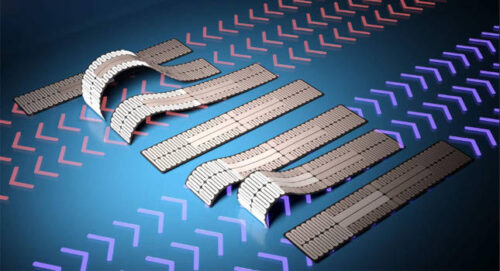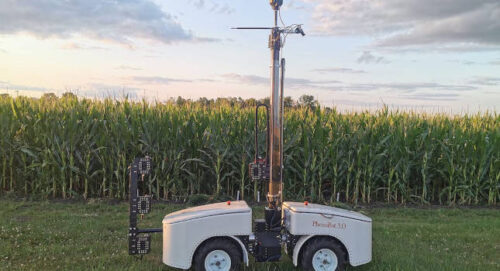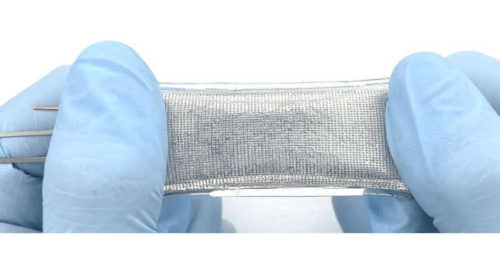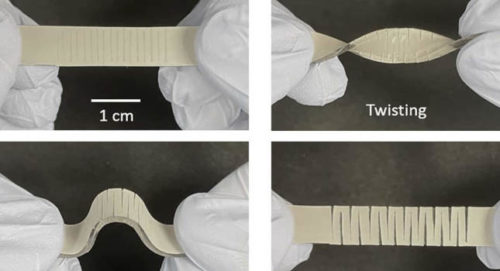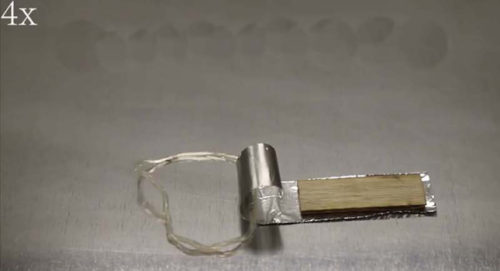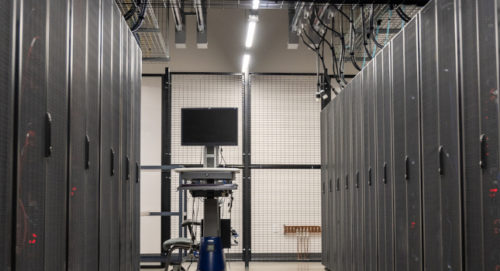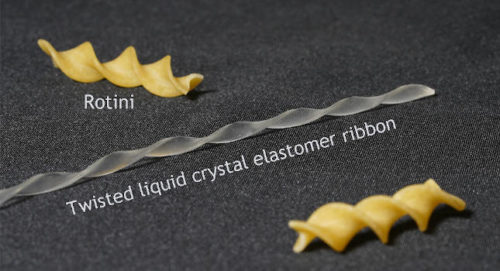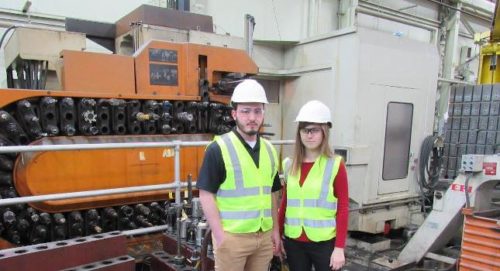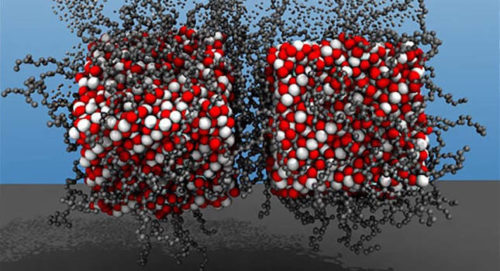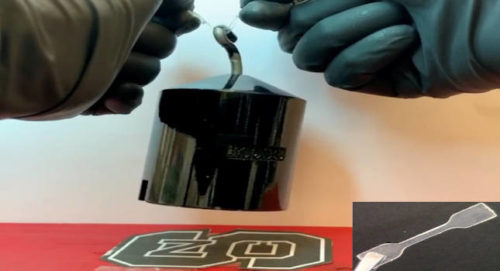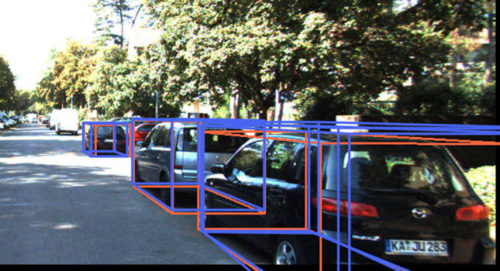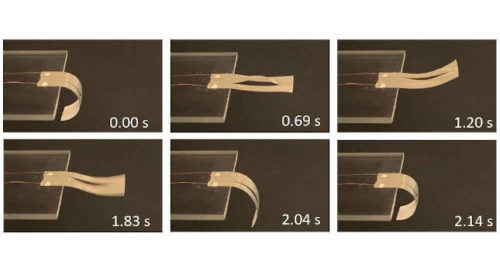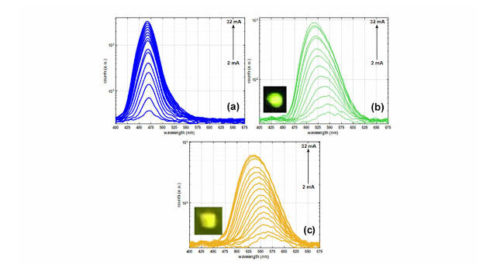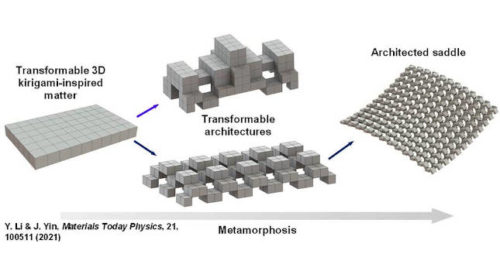Matt Shipman
Articles
Soft robot developed to navigate complex obstacles
北卡州立环宇ity researchers have created a “brainless” soft robot that can navigate more complex and dynamic environments. See video.
Robot platform designed to develop range of semiconductor materials
Researchers have created RoboMapper, which can conduct experiments to develop a range of semiconductor materials with desirable attributes.
AI framework helps boost teamwork training
Researchers have developed an AI framework that is better at analyzing and categorizing dialogue to make teamwork easier.
Method improves vision transformer AI system efficiency
North Carolina State researchers are working on improving vision transformers' (ViTs) efficiency so they can simplify their computing power and make their decision-making abilities more transparent.
Robot caterpillar demonstrates approach to locomotion for soft robotics
A caterpillar-like soft robot that can move forward, backward and dip under narrow spaces has been developed.
Wheeled robot measures leaf angles to help corn plants
Researchers have demonstrated an automated technology capable of accurately measuring the angle of leaves on corn plants in the field, providing farmers with useful data more quickly.
Elastic material impervious to gases, liquids developed
Researchers have developed a technique that uses liquid metal to create an elastic material impervious to gases and liquids, which could help improve protection from gases.
Researchers demonstrate strain sensors for machine interface technology
Researchers have developed a stretchable strain sensor that combines sensitivity and range, allowing it to detect minor changes in strain than previous technologies.
Autonomous crawling ringbots navigate narrow gaps
Researchers at North Carolina State University have created a ring-shaped soft robot capable of pulling a small payload across the surface – in ambient air or under water, as well as passing through a gap narrower than its ring size. See video
Network pruning can skew deep learning models
北卡州立环宇ity researchers learn that network pruning can adversely affect the performance of the model at identifying certain groups.
Formula tackles complex moral decision-making for AI
A blueprint for creating algorithms that more effectively incorporate ethical guidelines into artificial intelligence (AI) decision-making programs has been developed.
Helping autonomous vehicles navigate tricky highway merges
If autonomous vehicles are ever going to achieve widespread adoption, we need to know they are capable of navigating complex traffic situations, such as merging into heavy traffic when lanes disappear on a highway.
Approach to federated learning developed for creating AI models faster
北卡州立环宇ity researchers have developed an approach to federated learning that allows them to develop accurate artificial intelligence (AI) models more quickly.
Twisted soft robots navigate mazes without human or computer guidance
Researchers have developed soft robots that are capable of navigating complex environments without input from humans or computer software. See video.
Self-driving lab used to improve nanocrystal understanding
Researchers have developed and demonstrated a ‘self-driving lab’ that uses AI and fluidic systems to advance understanding of metal halide perovskite (MHP) nanocrystals, which could be used to improve many different materials.
Inclusivity is key to promoting STEM education
A North Carolina State University study finds that one key to promoting STEM education is making classrooms feel more inclusive.
Multi-functional magnetic nanoparticles simulations help sensor technology
Researchers at North Carolina State University have developed a computational tool that allows users to conduct simulations of multi-functional magnetic nanoparticles, which could be used in applications such as drug delivery and sensor technologies.
3D-printable material designed to be tough, flexible
北卡州立环宇ity researchers have created ionogel materials that are stretchable, tough and can be 3D-printed.
Technique makes federated learning easier for AI in wireless devices
A technique developed by North Carolina State University researchers uses compression to drastically reduce the size of data transmissions, creating additional opportunities for artificial intelligence (AI) training on wireless technologies.
Technique improves AI ability to understand 3D space using 2D Images
北卡州立环宇ity researchers have developed a technique called MonoCon that is designed to improve the ability to identify 3D objects using 2D images.
Technique speeds up thermal actuation for soft robotics
A new design for thermal actuators has been developed to help create rapid movement in soft robotic devices.
Synthesis process paves way for more efficient lasers, LEDs
北卡州立环宇ity have developed a process that makes use of existing industry standard techniques for making III-nitride semiconductor materials, but results in layered materials that will make LEDs and lasers more efficient.
Shape-shifting architecture materials created
Researchers at North Carolina State University have developed materials that can transform into multiple different architectures, which could benefit applications ranging from construction to robotics. See video.
Metamaterial reconfigured to modify its thermal, electromagnetic properties
The metamaterial is made using 3D printing technologies, which allows engineers to create networks of tiny tubes, known as microvasculature, that can be incorporated into a range of structural composites.
Technique for recycling nanowires developed
A technique for retrieving nanowires from electronic devices that have reached the end of their utility and then using those nanowires in new devices has been developed by North Carolina State University researchers.
Controlling how AI systems create images
北卡州立环宇ity researchers have developed a method for controlling how artificial intelligence (AI) systems create images, which could help in applications such as autonomous robotics and AI training.
Robots learning to grasp friction
一个新的物理定律,占机器人grip objects, particularly web ones, has been discovered by North Carolina State University researchers.
Virtual lab uses AI tool for chemistry issues
A virtual laboratory can be used to determine the artificial intelligence (AI) tools best suited for addressing various chemical synthesis challenges and it could be used for other applications.
Data processing module makes deep neural networks smarter
Combining feature normalization and feature attention modules into a single module called attentive normalization (AN) improved deep neural networks' performance.
Computational model developed for COVID-19 testing allocation
A computational model that can be used to identify the best allocation plans for distributing COVID-19 test kits to hospitals, clinics, and relevant state agencies has been developed by North Carolina State researchers.
Manage data flow to boost cyber-physical system performance
A suite of algorithms has been developed to improve the performance of cyber-physical systems by balancing each component’s need for data with how fast that data can be sent and received.
Computational model developed to build better capacitors
北卡州立环宇ity researchers have developed a computational model that shows how changes in the nanostructure of materials affect their conductivity, which could help improve energy storage devices for many electronic devices.
Automated system developed to accelerate R&D, manufacturing of materials
North Carolina State and University of Buffalo researchers have developed Artificial Chemist, which is a technology that incorporates artificial intelligence (AI) and an automated system for performing chemical reactions to accelerate R&D and manufacturing of commercially desirable materials.
Researchers incorporate computer vision, uncertainty into AI for robotic prosthetics
Researchers at North Carolina State University have developed software to enable people using robotic prosthetics or exoskeletons to walk in a safer, more natural manner on different types of terrain.
Soft robot movement speed inspired by cheetahs
北卡州立环宇ity researchers have developed a type of soft robot capable of moving more quickly on solid surfaces or in the water, which was inspired by how cheetahs move.
Breathable electronics could lead to functional long-term wearable technology
北卡州立环宇ity engineering researchers have created ultrathin, stretchable electronic material that is gas permeable and is designed specifically for use in biomedical or long-term wearable technologies. See video.
Ethylene catalyst for manufacturing, shale gas developed
北卡州立环宇ity researchers engineered a catalyst that can more efficiently convert ethane into ethylene, which is used in a variety of manufacturing processes including plastics and shale gas.
Companies benefit from sharing cybersecurity efforts
A study from North Carolina State University finds that companies that disclosed cybersecurity risk management efforts before and after a competitor’s breach fared the best.
Framework developed to make AI more transparent without sacrificing performance
北卡州立环宇ity researchers are proposing a framework that would allow users to understand the rationale behind artificial intelligence (AI) decisions, which would improve transparency and move away from black box systems.
Composite metal foam beneficial for aerospace manufacturing
北卡州立大学的研究人员ound that a combination of steel composite metal foam (CMF) and epoxy resin has more benefits than the aluminum currently in widespread use for aircraft wings.
Technology developed that computes and responds without centralized processing
North Carolina State researchers have developed a structure called soft tactile logic, which senses, computes and responds without any centralized processing and has the characteristics of a robot and computer.
Using Wi-Fi sonar to measure indoor movement speed and distance
Researchers from North Carolina State University have developed a technique for measuring speed and distance in indoor environments called Wi-Fi-assisted inertial odometry (WIO), which could be used to improve navigation technologies for robots and drones.
Controlling soft robot movements with light, magnets
Researchers have developed a technique that allows them to remotely control the movement of soft robots using light and magnetic fields.
Mobile process sensor technology developed to identify plant diseases
北卡州立环宇ity researchers have developed a mobile process sensor that uses analytics to identify plant diseases in the field by sampling airborne volatile organic compounds (VOCs) plants release through their leaves with a mobile instrumentation device.
Technique developed to allow real-time microscopy at high heat and loading
Researchers at North Carolina State University have demonstrated a technique called in situ scanning electron microscopy (SEM) heating and loading, which allows them to track microscopic changes in metals or other materials in real time in extreme environments such as nuclear reactors.
Teaching the next generation of cryptographic hardware experts
Aydin Aysu, a researcher at North Carolina State University, is offering a course to prepare students to make use of next-generation cybersecurity tools such as cryptography hardware.
Framework developed to help deep neural network performance
北卡州立环宇ity researchers have developed AOGNets, a framework for building deep neural networks that uses a compositional grammar approach to extract useful information from raw data.
Framework improves continual learning for artificial intelligence
North Carolina State researchers have developed a framework for deep neural networks that allows artificial intelligence (AI) systems to become better at performing previous tasks by learning from its prior actions.
Technique developed to reduce training time for deep learning networks
北卡州立环宇ity researchers have developed a technique that reduces training time for deep learning networks without sacrificing accuracy.
Nanocrystals improve quantum dot manufacturing for process monitoring applications
北卡州立环宇ity researchers have developed a system for synthesizing perovskite quantum dots to reduce manufacturing costs for real-time process monitoring to help ensure quality control.





